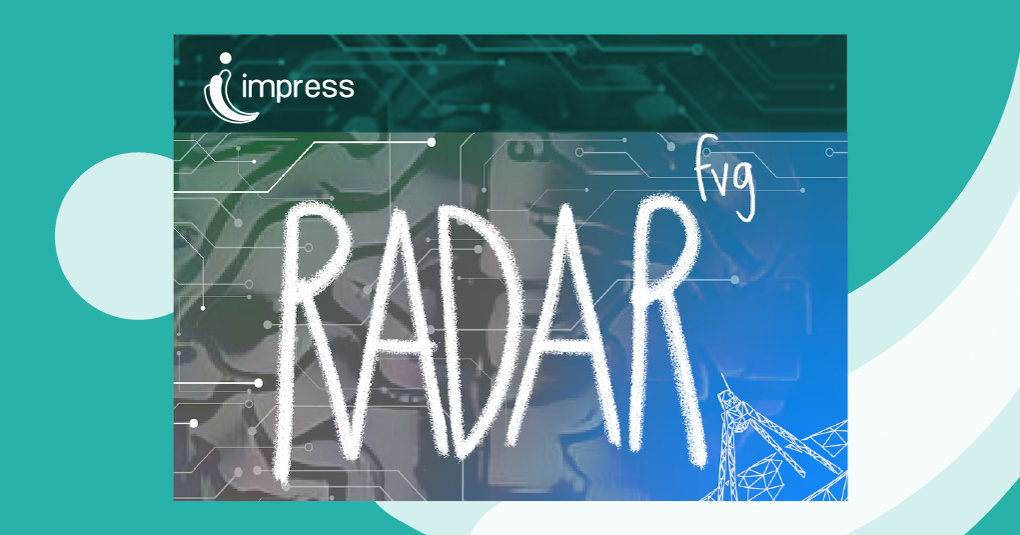
IMPRESS Project Coordinator Regina Ciancio featured on prominent radio science program

In an engaging interview on the Italian science radio program Radar, Regina Ciancio highlights the work of the Laboratory of Electron Microscopy for Materials (LAME) within the IMPRESS project and other European research and innovation initiatives.
On December 10th, Regina Ciancio, Coordinator of the IMPRESS Project, was interviewed on Radar, a weekly RAI Radio 3 FVG program spotlighting the scientific endeavours flourishing in the Friuli Venezia Giulia region of Italy. Regina Ciancio also leads the Laboratory of Electron Microscopy for Materials (LAME), established in 2022 at Area Science Park in Trieste, Italy. This laboratory is at the forefront of characterizing materials to advance scientific knowledge and find new solutions for innovative applications in a variety of fields, ranging from microelectronics to energy efficiency and metallurgical processes, to name just a few.
A deep dive into electron microscopy
During the interview, Regina Ciancio provided a compelling look inside LAME’s electron microscopy facilities, helping the general public understand how such an advanced laboratory is organized, how it operates, what tools it uses and for which purposes. This state-of-the-art laboratory explores material properties with unparalleled precision, employing Transmission Electron Microscopy (TEM) and Scanning Electron Microscopy (SEM). These techniques rely on the interaction of electron beams with material atoms to create ultra-high-resolution images. “TEM, in particular” explains Regina Ciancio, “achieves atomic-level resolution, offering crucial insights into the structural and chemical composition of materials, as well as their electronic properties.”
The IMPRESS Project Coordinator emphasized how the research conducted by microscopists is pivotal to innovation. Indeed, the insights provided aid scientists and industries in improving the performance, sustainability and application-specific suitability of materials. Electron microscopy not only reveals the inner workings of materials but also supports the development of customized functionalities, critical for applications like microelectronics, energy efficiency and sustainable manufacturing, among others.
IMPRESS: Redefining Transmission Electron Microscopy
Among the various European projects in which Regina Ciancio and LAME are involved is the IMPRESS Project, an ambitious Horizon Europe initiative set to revolutionize the horizon of Transmission Electron Microscopy. This project aims to design and develop TEM instrumentation built on a foundation of open standards and interoperability. The cutting-edge TEM platform will feature a modular architecture with interchangeable components, enabling scientists to easily customize and adjust the equipment to meet the specific needs of diverse scientific communities.
“By prioritizing flexibility, the project seeks to reverse the traditional approach”, points out Regina Ciancio. “Instead of adapting experiments to fit the constraints of TEMs, the new instruments will be adaptable to support a wide range of multimodal experiments”.
Innovation for sustainability
Regina Ciancio also highlighted other ongoing efforts at LAME, such as the REMADE Project, which supports the European Green Deal by developing circular economy strategies. She also discussed NFFA-EU, which focuses on a multidisciplinary approach to material analysis for nanoscience and nanotechnology. Through IMPRESS and the other European projects, LAME demonstrates its commitment to sustainability, innovation and scientific excellence.
The key element across all these initiatives is the multidisciplinary approach and the interoperability of diverse tools, techniques and equipment. This lays the foundation for the development of innovative devices and advanced scientific solutions to tackle future challenges and address emerging global needs.
For a deeper dive into Regina Ciancio’s insights, including her exploration of cutting-edge electron microscopy techniques, you can listen to the full interview in Italian on Radar, RAI Radio 3 FVG (min 29:50-42:20).